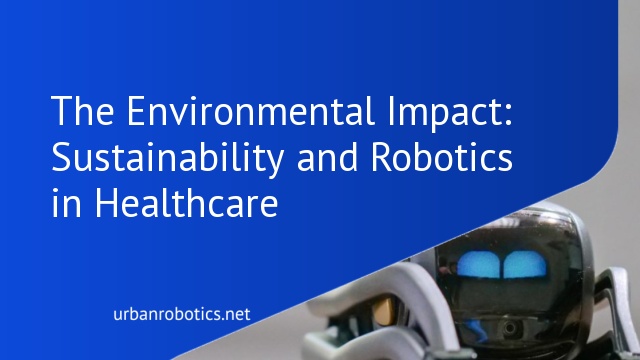Artificial intelligence (AI) has the potential to revolutionize healthcare by improving accessibility and filling gaps in healthcare provision. However, the use of AI in healthcare also raises concerns about patient safety and ethical considerations. One important aspect that often goes overlooked is the environmental impact of AI in healthcare. Health systems emit a significant amount of carbon, contributing to climate change. As AI becomes increasingly integrated into healthcare, it is crucial to examine its environmental sustainability. This article provides an overview of carbon emissions in healthcare and explores the need for sustainable AI in healthcare through the lens of health, justice, and resource conservation. It also evaluates examples of sustainable and unsustainable development and use of AI in healthcare.
The Carbon Emissions in Healthcare
When discussing the environmental impact of AI in healthcare, it is essential to address the significant carbon emissions generated by the healthcare industry. In the United States alone, healthcare systems emit approximately 479 million metric tons of carbon dioxide annually, contributing to nearly 8% of the country’s total emissions. This alarming figure highlights the urgent need to assess and mitigate the carbon footprint of healthcare to combat climate change and its associated health risks.
However, it’s not just the United States that faces this issue. Other countries, such as China and the United Kingdom, also grapple with substantial medical carbon emissions. These emissions transcend borders, making it a global concern that requires immediate attention. By understanding the extent of carbon emissions in healthcare, we can develop effective strategies to reduce our environmental impact and create a more sustainable future.
The Carbon Emissions in Healthcare:
| Country | Annual Healthcare Carbon Emissions (metric tons) |
|---|---|
| United States | 479 million |
| China | Unknown |
| United Kingdom | Unknown |
Table: Annual Healthcare Carbon Emissions in Select Countries.
By highlighting the scale of carbon emissions in healthcare, we can work towards implementing sustainable practices that reduce our impact on the environment. Through the development of eco-friendly medical technologies and the adoption of energy-efficient practices, we can mitigate carbon emissions and pave the way for a greener, more sustainable healthcare system.
Insufficient Addressing of Sustainability in Healthcare through Carbon Calculations
While carbon emissions are an important aspect of environmental sustainability in healthcare, relying solely on carbon calculations is insufficient. There are several reasons for this.
Firstly, the assumption that all available healthcare technologies are medically necessary and therefore carbon emissions are morally irrelevant overlooks the environmental impact of healthcare delivery. Carbon emissions calculations often focus on the carbon footprint of hospitals and buildings, neglecting other significant contributors such as clinical services and physician care.
Secondly, AI in healthcare has a considerable carbon impact throughout its lifecycle, including programming, development, and use. The extraction of minerals and resources necessary for AI hardware also has significant environmental implications. Therefore, a comprehensive approach to sustainability in healthcare must go beyond carbon calculations and consider broader ethical and environmental factors.
Criteria for Sustainable AI in Healthcare
To ensure that AI in healthcare is sustainable, it is crucial to establish criteria based on ethical principles, healthcare goals, and environmental ethics. We propose three key criteria: health, justice, and resource conservation. By evaluating the development and use of AI in healthcare through these lenses, we can identify sustainable practices and guide future ethical approaches to AI.
Health
The first criterion for sustainable AI in healthcare is health. This refers to AI’s ability to improve health outcomes while minimizing harm. Sustainable AI should contribute to better patient outcomes, whether it’s through accurate diagnoses, personalized treatments, or effective monitoring. By prioritizing health, we can ensure that AI technologies are designed and implemented with the goal of improving the well-being of patients and communities.
Justice
Justice is another critical criterion for sustainable AI in healthcare. It emphasizes equitable access to AI technologies, addressing disparities, and ensuring that vulnerable populations benefit from advancements. Sustainable AI should not exacerbate existing inequalities but should strive to bridge the gap in healthcare access. By promoting justice, we can work towards a healthcare system that is fair and inclusive for all.
Resource Conservation
The third criterion for sustainable AI in healthcare is resource conservation. This focuses on minimizing the environmental impact of AI by utilizing resources responsibly and sustainably. From the extraction of minerals for AI hardware to the energy consumption of AI systems, resource conservation is vital to reduce the carbon footprint of AI in healthcare. Sustainable AI should aim to minimize waste, reduce energy consumption, and explore eco-friendly alternatives. By prioritizing resource conservation, we can mitigate the environmental impact of AI in healthcare and contribute to a greener future.
| Criteria | Description |
|---|---|
| Health | AI should improve health outcomes and minimize harm to patients. |
| Justice | AI should promote equitable access to healthcare for all individuals and address disparities. |
| Resource Conservation | AI should minimize environmental impact by utilizing resources responsibly and sustainably. |
Sustainable and Unsustainable Use of AI in Healthcare
When it comes to the use of AI in healthcare, it is essential to distinguish between sustainable and unsustainable practices. Sustainable use of AI involves practices that prioritize health outcomes, promote equity, and minimize environmental impact, while unsustainable use can have the opposite effect. By evaluating AI technologies based on three criteria – health, justice, and resource conservation – we can determine their sustainability and guide ethical decision-making.
Sustainable Use of AI in Healthcare
In sustainable use of AI, technology is harnessed to improve health outcomes while minimizing harm to patients and the environment. For instance, AI-enabled remote access to healthcare services can enhance accessibility for underserved populations, reducing the need for transportation and decreasing carbon emissions. Additionally, AI can help optimize healthcare delivery systems, leading to more efficient resource utilization and reduced waste. Sustainable use of AI also involves promoting justice by ensuring equitable access to AI technologies and addressing healthcare disparities.
Unsustainable Use of AI in Healthcare
On the other hand, unsustainable use of AI in healthcare involves practices that prioritize profit over health outcomes, exacerbate inequalities, and have a significant carbon impact. For example, the use of AI solely for revenue generation without considering patient well-being can result in suboptimal care and negative health outcomes. Furthermore, the development and use of AI technologies without proper consideration for their environmental impact can contribute to carbon emissions and resource depletion. It is crucial to identify and address these unsustainable practices to ensure the ethical and sustainable integration of AI in healthcare.
The table below provides a summary of sustainable and unsustainable use of AI in healthcare based on the criteria of health, justice, and resource conservation.
| Sustainable Use of AI | Unsustainable Use of AI | |
|---|---|---|
| Health | Prioritizes patient well-being and improved health outcomes | Focuses on profit over patient well-being; may result in suboptimal care |
| Justice | Ensures equitable access to AI technologies and addresses healthcare disparities | Exacerbates inequalities; limited access to AI technologies for vulnerable populations |
| Resource Conservation | Minimizes environmental impact and optimizes resource utilization in healthcare | Disregards environmental considerations and contributes to carbon emissions |
By understanding the distinction between sustainable and unsustainable use of AI in healthcare, we can work towards promoting ethical practices that prioritize both patient well-being and environmental sustainability. Through the integration of sustainability criteria into the development, use, and evaluation of AI technologies, we can foster a future where healthcare advancements benefit all while minimizing their carbon impact.
The Imperative for Environmental Sustainability in AI Ethics
As we continue to navigate the ethical considerations surrounding the use of artificial intelligence (AI) in healthcare, it is crucial to recognize the imperative for environmental sustainability. The carbon emissions generated by healthcare systems and AI technologies have far-reaching consequences, including adverse health effects and the exacerbation of social inequalities. To ensure a more sustainable and eco-friendly future for healthcare, it is essential to prioritize environmental sustainability in the ethical guidelines for AI.
By incorporating environmental sustainability into AI ethics, we can mitigate the negative impact and pave the way for a greener healthcare industry. This means considering the environmental implications of AI throughout its lifecycle – from programming and development to its use in patient care. It also involves examining the extraction of minerals and resources needed for AI hardware, as well as the carbon footprint of healthcare delivery.
The Healthcare Impact
The healthcare industry has a significant carbon footprint, contributing to climate change and its associated health hazards. By addressing the environmental impact of AI in healthcare, we can work towards minimizing carbon emissions and reducing our overall ecological footprint. Additionally, integrating sustainability criteria into the development and use of AI in healthcare – such as health, justice, and resource conservation – allows us to prioritize positive patient outcomes and equitable access while minimizing harm to the environment.
| Impact | Actions |
|---|---|
| Carbon emissions from healthcare | Implement measures to reduce carbon emissions in healthcare facilities, such as energy-efficient technologies, renewable energy sources, and waste reduction initiatives. |
| Carbon emissions from AI technologies | Encourage the development and use of sustainable AI technologies, considering their environmental impact throughout the entire lifecycle, including responsible sourcing of materials and energy-efficient design. |
| Environmental impact of healthcare delivery | Promote eco-friendly practices in healthcare delivery, such as telemedicine and remote access to healthcare services, to reduce the carbon emissions associated with transportation and facility operations. |
By embracing the imperative for environmental sustainability in AI ethics, we can foster a more sustainable future for healthcare robotics. Through a holistic approach that considers environmental, ethical, and healthcare impact, we can leverage AI technologies to improve patient outcomes while minimizing their environmental footprint. By prioritizing sustainability, we can create a greener and more equitable healthcare system for all.
Conclusion: Towards a Sustainable Future for Healthcare Robotics
As we look towards the future of healthcare robotics and AI, it is crucial that we prioritize environmental sustainability. The impact of carbon emissions from healthcare systems and AI technologies cannot be ignored if we want to create a sustainable future. By integrating sustainability criteria, such as health, justice, and resource conservation, into the development, use, and evaluation of AI in healthcare, we can minimize harm to both people and the planet.
Our approach to AI ethics must include a strong emphasis on environmental sustainability. We cannot disregard the far-reaching consequences of carbon emissions, from adverse health effects to exacerbating social inequalities. By making environmental sustainability an integral part of ethical guidelines for AI in healthcare, alongside principles like beneficence and autonomy, we can ensure a more sustainable and eco-friendly future for healthcare.
In order to achieve a sustainable future for healthcare robotics, we must adopt ethical reflection and sustainable practices. By considering the environmental impact of healthcare systems and the carbon footprint of AI technologies, we can minimize harm while maximizing positive health outcomes. It is through this careful integration of sustainability into all aspects of healthcare robotics that we can pave the way for a future where advancements in technology go hand in hand with a healthier and greener planet.





